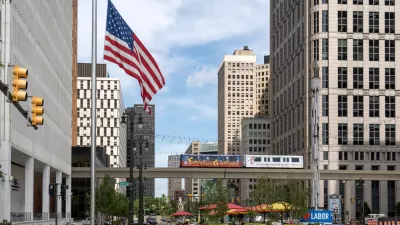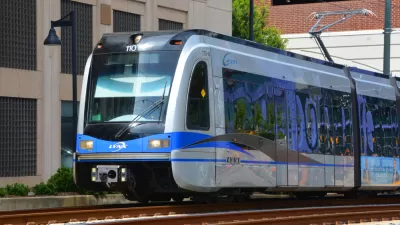Involving four counties and $4.6 billion, the measure proposes a system that could put a million residents (and a million jobs) within a quarter mile of transit.

For a long time, regional transit has been just one more underdeveloped service in southern Michigan. But in November, that will likely change. Angie Schmitt writes, "It took 40 years and 23 failed attempts for Detroit and its suburbs to establish a regional transit agency. They finally won state support to establish the RTA in 2012."
But the Regional Transit Authority of Southeast Michigan can only do so much with its current resources. "Transit service in the region is fragmented and unreliable, even though a quarter of city residents don't own cars. The severity of the problem was encapsulated by the story of James Robertson, whose commute to a factory job in the suburbs required taking two buses and walking 21 miles."
Leading up to the vote this November, "The Detroit region has put together a $4.6 billion, four-county plan to improve transit. The centerpiece is a network of bus rapid transit lines extending out from downtown. Funded by a 20-year property tax increase, the measure would cost the average homeowner in the region about $95 a year."
The plan: four bus rapid transit (BRT) lines connecting Detroit to regional employment centers outside the city proper (as far as Pontiac and Ann Arbor). On top of that, "regional rail" between Ann Arbor and Detroit's downtown.
All signs point to broad regional support for the measure. "Some opposition emerged from the northern suburbs, but key political actors who could have blocked it, like Oakland County Executive Brooks Patterson (the 'Sprawl King') have opted not to."
FULL STORY: Transit Vote 2016: With Historic Decision, Detroit Could Heal Old Divides

Planetizen Federal Action Tracker
A weekly monitor of how Trump’s orders and actions are impacting planners and planning in America.

San Francisco's School District Spent $105M To Build Affordable Housing for Teachers — And That's Just the Beginning
SFUSD joins a growing list of school districts using their land holdings to address housing affordability challenges faced by their own employees.

The Tiny, Adorable $7,000 Car Turning Japan Onto EVs
The single seat Mibot charges from a regular plug as quickly as an iPad, and is about half the price of an average EV.

Seattle's Plan for Adopting Driverless Cars
Equity, safety, accessibility and affordability are front of mind as the city prepares for robotaxis and other autonomous vehicles.

As Trump Phases Out FEMA, Is It Time to Flee the Floodplains?
With less federal funding available for disaster relief efforts, the need to relocate at-risk communities is more urgent than ever.

With Protected Lanes, 460% More People Commute by Bike
For those needing more ammo, more data proving what we already knew is here.
Urban Design for Planners 1: Software Tools
This six-course series explores essential urban design concepts using open source software and equips planners with the tools they need to participate fully in the urban design process.
Planning for Universal Design
Learn the tools for implementing Universal Design in planning regulations.
Smith Gee Studio
City of Charlotte
City of Camden Redevelopment Agency
City of Astoria
Transportation Research & Education Center (TREC) at Portland State University
US High Speed Rail Association
City of Camden Redevelopment Agency
Municipality of Princeton (NJ)





























